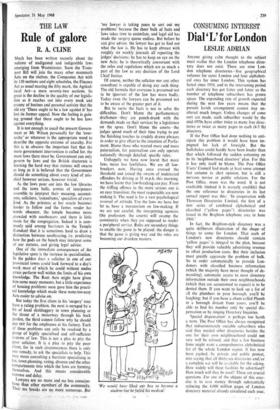Rule •of galore
THE LAW R. A. CLINE
Much has been written recently about the volUme of undigested and indigestible laws emerging from Westminster. Soon the Trans- port Bill will join the many other mammoth Acts on the shelves, the Companies Act with its 130 sections and eight schedules, the Finance Act as usual nearing the fifty mark, the Agricul- tural Act—a mere seventy-two sections. So great is the decline in the quality of our legisla- tion as it reaches out into every nook and cranny of busines and personal activity that the old cry `There ought to be a law against it' has lost its former appeal. Now the feeling is gain- ing ground that there ought to be less laws against everything.
It is not enough to assail the present Govern- ment or Mr Wilson personally for the `over- archy' or whatever is the appropriate word to describe the opposite extreme of anarchy. For this is to obscure the important fact that the more government intervention is called for, the more laws there must be. Government can only govern by laws and the British electorate is learning the hard way that statutes will swarm as long as it is believed that the Government should do something about every kind of mis- chief however serious, however trivial.
As the laws pour out into the law libraries and the town halls, armies of interpreters assemble to interpret their meaning, account- ants, solicitors, 'consultants,' specialists of every kind. As the priestess at her oracle becomes harder to follow and the fumes render her words obscurer, the temple becomes more crowded with soothsayers and there is little room for the congregation. Indeed it is com- monly said among barristers in the Temple (London) that it is sometimes hard to draw a distinction between soothsaying, i.e. predicting how the gods on the bench may interpret some of our statutes, and giving legal advice.
One of the immediate consequences of the legislative spate is the increase in specialisation. In the golden days a solicitor in one of .our provincial towns could look forward to a day's work most of which he could without undue strain perform well within the limits of his own knowledge. The Rent Acts might have given him some nasty moments, but a little experience of housing problems soon gave him the practi- cal knowledge which made these none-too-easy Acts easier to advise on.
But today the first client in his 'surgery' may have a rating problem, the next is enraged by a bit of local skulduggery in town planning or the threat of a motorway through his back garden, the third cannot follow why he should Pay SET for the employees at his factory. Each of these problems can only be resolved by a group of highly specialised and self-sufficient systems of law. This is not a plea to pity the poor solicitor. It is a plea to pity the poor client, for in such circumstances there is only one remedy, to ask the specialists to help. This may mean consulting a barrister specialising in tax, town planning, rating, divorce and the other compartments into which the laws are forming themselves. And this means considerable expense and delay.
Lawyers are no more and no, less conscien- tious than other memberi of the community. Their tea breaks are no more numerous. ,But `my lawyer is taking years to sort out my • problems' 'because the sheer 'bulk of facts and 'laws takes time to assimilate,•and legal aid has made the surgery queue endless. But 'before he '
can give advice. the lawyer has got to find out what the law is. He has to keep abreast with roughly six weekly journals all' reporting the judges' decisions; he has to keep an eye on the new Acts; he is theoretically conversant with the rules and regulations which are as much a part of the law as any decision of the Lord Chief Justice.
Of course, neither the solicitor nor any other consultant is capable of doing any such thing. The old formula that everyone is presumed not to be ignorant of the law has worn badly. Today even the lawyers can be presumed not to be aware of the greater part of it.
But to recite the facts is not to solve the difficulties. Don't blame the parliamentary draftsmen---'-they are punch-drunk with the demands made on their services' by a legislature on the spree. Don't blame the courts—the judges spend much of their time trying to put the finishing touches to crudely drawn phrases in order to give effect.to the intention of Parlia- ment. Blame those who wanted more and more paternalism, for paternalism can only operate nationally through detailed, specific rules.
Unhappily we have now learnt that more laws mean less lawfulness. We are all law- breakers now. Having once crossed the threshold and joined the swarm of undetected offenders by driving at 31 m.p.h. this morning, we have learnt that law-breaking can pay. From the trifling offence to the more serious one is an easy transition; the most respectable are now making it. The need is for a vast psychological reversal of attitude. Use The laws we have but let us have a moratorium on law-making. If we are not careful, the interpreting agencies (the profession, the courts) wilt swamp the community when they are supposed to render a peripheral service. Rules are secondary things to enable the game to be played; the danger is that the game is giving way and the rules are becoming our drunken masters.
We would have liked oar boy to become a
student but. he faithd his medical.'
(4






































 Previous page
Previous page